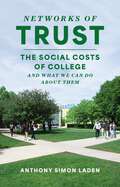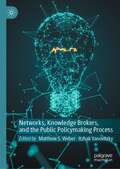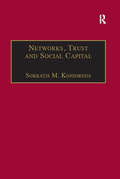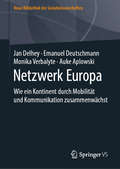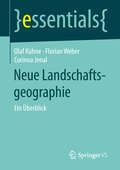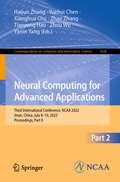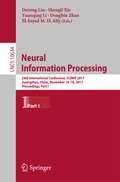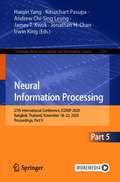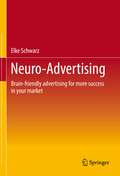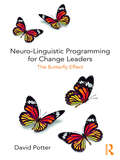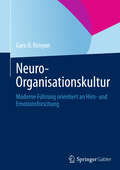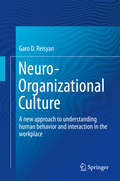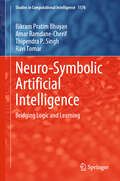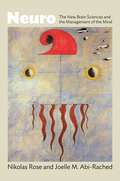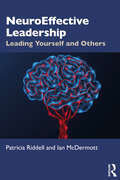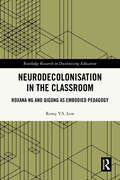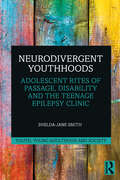- Table View
- List View
Networks of Trust: The Social Costs of College and What We Can Do about Them
by Anthony Simon LadenAn eye-opening look at how parents’ mistrust of colleges has less to do with what their kids are learning than with whom they come to trust. Higher education is a familiar battlefield in today’s culture wars. The right accuses colleges and universities of indoctrinating conservative students with liberal values; the left, with failing to be sufficiently inclusive. The anxieties expressed on both sides of the political spectrum have much in common, however, and they are triggered not by colleges’ failures but by their successes. So argues philosopher Anthony Simon Laden in Networks of Trust. He highlights how a college education shapes students’ informational trust networks: the complex set of people and institutions they rely on for the information they use to think about and understand the world. While the networks that colleges build for students have great value, learning to inhabit them pulls some students away from their families and communities. If many people distrust institutions of higher education, this is one reason why. Networks of Trust offers a path forward, one that preserves the value while reducing the harms of a college education. It includes concrete suggestions for how colleges and universities can educate students in a manner that inspires and deserves trust: one that bridges rather than deepens our social divides.
Networks, Knowledge Brokers, and the Public Policymaking Process
by Matthew S. Weber Itzhak YanovitzkySocial network analysis provides a meaningful lens for advancing a more nuanced understanding of the communication networks and practices that bring together policy advocates and practitioners in their day-to-day efforts to broker evidence into policymaking processes. This book advances knowledge brokerage scholarship and methodology as applied to policymaking contexts, focusing on the ways in which knowledge and research are utilized, and go on to influence policy and practice decisions across domains, including communication, health and education. There is a growing recognition that knowledge brokers – key intermediaries – have an important role in calling attention to research evidence that can facilitate the successful implementation of evidence-informed policies and practices. The chapters in this volume focus explicitly on the history of knowledge brokerage research in these contexts and the frameworks and methodologies that bridge these disparate domains. The contributors to this volume offer useful typologies of knowledge brokerage and explicate the range of causal mechanisms that enable knowledge brokers’ influence on policymaking. The work included in this volume responds to this emerging interest by comparing, assessing, and delineating social network approaches to knowledge brokerage across domains. The book is a useful resource for students and scholars of social network analysis and policymaking, including in health, communication, public policy and education policy.
Networks, Trust and Social Capital: Theoretical and Empirical Investigations from Europe
by Sokratis M. KoniordosThe concepts of social networks, social capital and trust play an increasingly central role in the social sciences. They have become indispensable conceptual tools for the analysis of post-industrial/late-modern societies, which are characterized by such features as the relative decline of formal hierarchies, the development of flexible social arrangements in the sphere of production and the extreme mobility of capital. This is the first book to study the interrelationships between these important concepts both theoretically and empirically. Drawing on empirical investigations from a range of diverse European social contexts, the contributors develop an economic sociology that builds on and extends established theoretical perspectives. The book opens with an introduction to the theoretical ideas: relating social capital to reciprocity, trust and social networks in line with current debates. The authors go on to discuss the concept of social embededdness, addressing the economic effects of social capital by examining the network and trust foundations of labour markets and investigating the structural limits of trusting networks. They conclude with an exploration of the impact of networking and the functioning of trust and social capital on the economic arrangements and performance of nascent capitalist economies in post-Communist Europe. This thematically unified collection by a team of distinguished contributors from across Europe provides an innovative and distinctive contribution to an expanding area of research.
Netzwerk Europa: Wie ein Kontinent durch Mobilität und Kommunikation zusammenwächst (Neue Bibliothek der Sozialwissenschaften)
by Jan Delhey Emanuel Deutschmann Monika Verbalyte Auke AplowskiDas Buch zeigt auf, wie sehr Europa in den letzten Jahrzehnten auf dem Weg zu einer immer engeren Union der Bürgerinnen und Bürger vorangekommen ist. Fast unbemerkt von Öffentlichkeit und Wissenschaft hat sich Europa „von unten“, durch grenzüberschreitende Aktivitäten der Menschen, sozial integriert. Mit anderen Worten: Es gibt unzählige Prozesse der europäischen Vergesellschaftung, die sich zum Netzwerk Europa verdichtet haben – keine supranationale Gesellschaft im klassischen Sinne, sondern ein Verdichtungsraum personeller Mobilität und Kommunikation. Das Buch widmet sich dieser europäischen Vergesellschaftung anhand von Migration, Auslandsstudium, Tourismus und Telefonie – und diskutiert, welche Chancen und Konflikte sich daraus für das Zusammenleben der Europäerinnen und Europäer ergeben.
Netzwerke als aufstiegsrelevanter Faktor für Frauen in Führungspositionen- gibt es branchenspezifische Unterschiede? (BestMasters)
by Julia SeefeldJe höher, desto seltener. Frauen stoßen in vielen privatwirtschaftlichen Betrieben in Deutschland immer noch vielfach an eine „gläserne Decke“, wenn sie Führungspositionen anstreben. Ausgangspunkt des vorliegenden Buches ist die durch Studien fundierte Beobachtung, dass ein Grund für den ausbleibenden Karriereaufstieg vieler Frauen im Vergleich zu Männern das Fehlen der richtigen Netzwerke sein könnte. Die Autorin untersucht mit Blick auf mögliche Unterschiede zwischen unterschiedlichen Branchen, über welche Netzwerke Frauen verfügen, die den Aufstieg in Führungspositionen geschafft haben.
Netzwerke und soziale Innovationen: Lösungsansätze für gesellschaftliche Herausforderungen? (Schriften zur Gruppen- und Organisationsdynamik #12)
by Ewald E. Krainz Christian Neugebauer Sebastian Pawel Helena BiritzIm vorliegenden Sammelband Netzwerke und Soziale Innovationen wird der Frage nachgegangen, welchen Beitrag Netzwerke bei der Entstehung und Entwicklung von sozialen Innovationen leisten können und wie dies zu Veränderungen in der Gesellschaft führt. In einem Mix aus theoretischen und reflexiven Beiträgen als auch der Darstellung von spannenden Initiativen und Projekten – von den InitiatorInnen selbst anschaulich geschildert –, wird die Thematik praxisorientiert aufgearbeitet. Sowohl PraktikerInnen als auch WissenschaftlicherInnen erhalten wertvolle Hinweise für die Organisation und Entwicklung sozialer Innovationen.
Neue Formen der politischen Praxis: Politische Partizipation in der postdemokratischen Wende (BestMasters)
by Jana Christine KernDas Buch setzt sich mit dem Wandel der politischen Systeme in den letzten Jahren auseinander. Politische Teilhabe wird im Kontext von gesellschaftlichen Dynamiken der Transnationalisierung, Globalisierung als auch Digitalisierung betrachtet. Neue Möglichkeiten der Teilhabe entstehen durch den Einzug von webbasierten Tools in den Alltag. Gleichzeitig werden die Gesellschaftsordnung und somit auch die politischen Aufgabenstellungen immer komplexer und es verbreitet sich eine Politikverdrossenheit oder auch Frustration mit demokratischen Prozessen und Akteur*innen. Wie diese Dynamiken sich auswirken, welche Schwierigkeiten dadurch auftreten und welche Potentiale neue Formen der Partizipation bieten, wird hier erläutert. Die Ausführungen beziehen sich dabei stark auf postdemokratische und Demokratiekrisen-Theorien und die Partizipationskultur in Österreich wird anhand von Regressionsanalysen basierend auf Partizipationsmodellen erforscht. Dabei werden konventionelle Partizipationspraktiken mit unkonventionellen und web-basierten Teilhabeformen verglichen.
Neue Landschaftsgeographie: Ein Überblick (essentials)
by Olaf Kühne Corinna Jenal Florian WeberIn diesem essential werden Meilensteine des Perspektivwechsels hin zu einer ,neuen Landschaftsgeographie‘ beleuchtet. ,Landschaft‘ gehört zu einem alltagsweltlich verankerten und vielgenutzten Begriff und Konzept. Nachdem die Landschaftsgeographie in der ersten Hälfte des 20. Jahrhunderts den ,Kern‘ des Faches bildete, geriet sie in den 1960er Jahren im Zuge einer Ausrichtung auf quantitative ,Raum‘-Forschungsansätze in den Hintergrund und sogar in Verruf. Seit den 2000er Jahren wird sich ,Landschaft‘ aus konstruktivistischen Perspektiven heraus erneut mit anderer Ausrichtung angenähert: Nicht mehr die Suche nach der ,Essenz‘ von ,Landschaft‘ steht im Fokus, sondern die Frage, wie diese sozial konstruiert wird. Zentrale aktuelle Ausrichtungen werden mit Forschungsbeispielen verdeutlicht, um einen Einblick in die ,neue Landschaftsgeographie‘ zu geben.
Neue Politische Ökonomie einfacher Gesellschaften: Wirtschafts- und politikethnologische Erkundungen
by Jürg Helblingwiefern lassen sich soziale Tatbestände in Gesellschaften von Wildbeutern und tribal organisierten Bauern/Viehzüchtern mit Hilfe von Spieltheorie, Institutionen- und Organisationsökonomik, "Public choice"- Theorie und der Evolutionsökonomik besser erklären als mit dem herkömmlichen Begriffs- und Modellinstrumentarium der Ethnologie? Inwiefern erlauben diese Ansätze, interessante Fragen zu stellen, die sich die Ethnologie bisher noch nicht gestellt hat?Neben einer kritischen Auseinandersetzung mit diesen akteurzentrierten Ansätzen, die sich oft an die neoklassische Theorie anlehnen, sollen wichtige Themen der Politischen Ökonomie einfacher Gesellschaften wie Produktions- und Machtstrategien, Legitimation von Machthierarchien, Gabentausch und Warentausch, Lokalgruppen und Verwandtschaftsbeziehungen, Krieg und Frieden sowie die Entstehung von Institutionen und Organisationsformen bei Wildbeutern und tribal organisierten Bauern/Viehzüchtern anhand von ethnographischen Fallbeispielen behandelt und im theoretischen Zusammenhang diskutiert werden.
Neue Stimmen in der psychosozialen Forschung
by Stephen FroshDie psychosozialen Studien im Vereinigten Königreich sind ein vielfältiger Arbeitsbereich, der sich durch Innovation in Theorie und empirischer Forschung auszeichnet. Die außerordentliche Lebendigkeit dieses Bereichs zeigt sich in diesem Buch, das die Forschungsarbeiten der Abteilung für psychosoziale Studien an der Birkbeck University of London, UK, vorstellt und drei zentrale Bereiche der Disziplin beleuchtet: Psychoanalyse, Ethik und Reflexivität sowie Widerstand. Das Buch befasst sich auf psychosoziale Weise mit einer Vielzahl von Themen, von der Sozialkritik der Psychoanalyse über postkoloniale und Queer-Theorie bis hin zu Studien über psychische Gesundheit und Widerstand gegen Diskriminierung. Diese "New Voices in Psychosocial Studies" bieten eine kohärente und doch weitreichende Darstellung der Forschung, die in einem "Dialekt" des neuen Terrains der psychosozialen Studien stattgefunden hat, und ein Agenda-setzendes Manifest für einige der Arten von Arbeit, die die fortgesetzte Kreativität der psychosozialen Studien in der nächsten Generation sicherstellen könnten. Dieses Buch zeigt die kontinuierliche Entwicklung der psychosozialen Studien als innovative, kritische Kraft und wird sowohl neue als auch etablierte Forscher aus allen Bereichen inspirieren, die ihren transdisziplinären Ansatz beeinflussen, einschließlich: kritische Psychologie und radikale Soziologie, feministische, queere und postkoloniale Theorie, kritische Anthropologie und Ethnographie und Phänomenologie.
Neue Technologien – neue Kindheiten?: Ethische und bildungsphilosophische Perspektiven (Techno:Phil – Aktuelle Herausforderungen der Technikphilosophie #3)
by Johannes Drerup Gottfried Schweiger Marc Fabian BuckZu den wichtigen sozialen Einflussgrößen, die nicht nur die Konstruktion, sondern auch die Realität und Praxis institutionalisierter Kindheit(en) mitbestimmen, gehören, so der Ausgangspunkt und der Gegenstand dieses Bandes, technologische Entwicklungen und die Anwendung und Nutzung von Techniken in der Kindheit für und durch Kinder. Technische Arrangements und Praktiken sind während der Kindheit omnipräsent. In diesem Band werden systematische ethische und erziehungs-, bildungs- und kindheitsphilosophische Fragen diskutiert, die sich im Umgang mit neuen Technologien und Techniken stellen. Hierzu zählen z.B. Fragen der folgenden Art: Wie sind (Neben-)Folgen der Einführung von AI-Systemen in Unterricht und Schule zu verstehen und zu bewerten? Dürfen Eltern die Fotos ihrer Kinder auf Facebook teilen? Welche Möglichkeiten und Fallstricke bietet die Nutzung von Robotern in pädagogischen Kontexten? Welche Rolle spielen neue Technologien bei der Gestaltung des Generationenverhältnisses und für technisch vermittelte und realisierte „Regime der Kindheit“?
Neue Wege für die Kultur?: Kommunikationsstrategien und -formate im europäischen Kultursektor
by Dominik Pietzcker Christina Vaih-BaurDieses Buch beleuchtet aktuelle Kommunikationsformen europäischer Kulturbetriebe aus wirtschaftlicher, künstlerischer und soziologischer Perspektive. Angebote von Opernhäusern und Theaterspielstätten während der Covid-19 Pandemie, digitale Formate von Museen sowie mäzenatische Sponsoringkonzepte für Kultureinrichtungen werden dargestellt, analysiert und im jeweiligen gesellschaftlichen Kontext verortet. Zudem werden Kommunikationskampagnen, insbesondere im digitalen Raum, von etablierten Kulturinstitutionen untersucht und vorgestellt. In Interviews kommen namhafte Repräsentantinnen und Repräsentanten des kulturellen Feldes zu Wort. Ein weiterer Schwerpunkt des Bandes liegt auf der Perspektive von Besucherinnen und Besuchern von Kultureinrichtungen. Was sind ihre Erwartungen, Idiosynkrasien und Einstellungen gegenüber dem kulturellen Angebot? Der Herausgeberband bietet in übersichtlicher Form wissenschaftliche Analysen, Case Studies und Trends im Bereich von Kunst, Kultur und ihrer Kommerzialisierung. Die Einbindung ästhetischer Phänomene der Sub- und Populärkultur rundet den Band ab.
Neues von der Insel: Englische Literatur und Kultur der Frühen Neuzeit in deutscher Übersetzung (Übersetzungskulturen der Frühen Neuzeit #2)
by Jörg Wesche Silvia Serena Tschopp Franz FromholzerEin interdisziplinärer Band im Open-Access: Die Aufwertung der Volkssprachen in der Frühen Neuzeit führte zu einer Intensivierung und internationalen Öffnung der europäischen Übersetzungskultur. Der Gebrauch des Englischen bleibt in dieser Zeit allerdings weitgehend auf die Insel beschränkt, während die Sprache auf dem Kontinent noch wenig geläufig ist. Erst seit dem 18. Jahrhundert gewinnt sie an internationaler Bedeutung und steigt schließlich zur modernen Weltsprache auf. Der Band fokussiert auf die vormoderne Situation und untersucht in 19 literatur-, kunst-, philosophie- und frömmigkeitsgeschichtlichen Fallstudien die deutsche Rezeption der frühneuzeitlichen englischen Literatur und Kultur. Mit Blick auf das bislang unzureichend erforschte deutsch-englische Interaktionsfeld erhellt er ebenso ausgewählte Personen, Institutionen und Wissensfelder wie Werkübertragungen, Gattungstransformationen und Übersetzungspraktiken, die den bereits in dieser Zeit bemerkenswert dichten Austausch zwischen England und dem Alten Reich prägten. Welche Netzwerke und Medien ermöglichten z.B. die Rezeption einflussreicher Denker und Dichter wie Bacon, Hobbes oder Milton im deutschsprachigen Raum; wie kam es gleichsam im Mutterland des Protestantismus zu einer auffallend intensiven Übersetzung englischer Erbauungsliteratur; welche Rolle spielten Parallelübersetzungen oder auch Übersetzungen aus zweiter Hand, etwa dort, wo der kulturelle Transfer über eine dritte Sprache wie das Französische oder Niederländische erfolgte? Auf solche Fragen werden im Band neue Antworten gegeben.
Neural Computing for Advanced Applications: Third International Conference, NCAA 2022, Jinan, China, July 8–10, 2022, Proceedings, Part II (Communications in Computer and Information Science #1638)
by Haijun Zhang Zhao Zhang Tianyong Hao Zhou Wu Yuehui Chen Xianghua Chu Yimin YangThe two-volume Proceedings set CCIS 1637 and 1638 constitutes the refereed proceedings of the Third International Conference on Neural Computing for Advanced Applications, NCAA 2022, held in Jinan, China, during July 8–10, 2022. The 77 papers included in these proceedings were carefully reviewed and selected from 205 submissions. These papers were categorized into 10 technical tracks, i.e., neural network theory, and cognitive sciences, machine learning, data mining, data security & privacy protection, and data-driven applications, computational intelligence, nature-inspired optimizers, and their engineering applications, cloud/edge/fog computing, the Internet of Things/Vehicles (IoT/IoV), and their system optimization, control systems, network synchronization, system integration, and industrial artificial intelligence, fuzzy logic, neuro-fuzzy systems, decision making, and their applications in management sciences, computer vision, image processing, and their industrial applications, natural language processing, machine translation, knowledge graphs, and their applications, Neural computing-based fault diagnosis, fault forecasting, prognostic management, and system modeling, and Spreading dynamics, forecasting, and other intelligent techniques against coronavirus disease (COVID-19).
Neural Information Processing: 24th International Conference, ICONIP 2017, Guangzhou, China, November 14-18, 2017, Proceedings, Part I (Lecture Notes in Computer Science #10634)
by Derong Liu, Shengli Xie, Yuanqing Li, Dongbin Zhao and El-Sayed M. El-AlfyThe six volume set LNCS 10634, LNCS 10635, LNCS 10636, LNCS 10637, LNCS 10638, and LNCS 10639 constitues the proceedings of the 24rd International Conference on Neural Information Processing, ICONIP 2017, held in Guangzhou, China, in November 2017. The 563 full papers presented were carefully reviewed and selected from 856 submissions. The 6 volumes are organized in topical sections on Machine Learning, Reinforcement Learning, Big Data Analysis, Deep Learning, Brain-Computer Interface, Computational Finance, Computer Vision, Neurodynamics, Sensory Perception and Decision Making, Computational Intelligence, Neural Data Analysis, Biomedical Engineering, Emotion and Bayesian Networks, Data Mining, Time-Series Analysis, Social Networks, Bioinformatics, Information Security and Social Cognition, Robotics and Control, Pattern Recognition, Neuromorphic Hardware and Speech Processing.
Neural Information Processing: 27th International Conference, ICONIP 2020, Bangkok, Thailand, November 18–22, 2020, Proceedings, Part V (Communications in Computer and Information Science #1333)
by Irwin King Jonathan H. Chan Haiqin Yang Kitsuchart Pasupa Andrew Chi-Sing Leung James T. KwokThe two-volume set CCIS 1332 and 1333 constitutes thoroughly refereed contributions presented at the 27th International Conference on Neural Information Processing, ICONIP 2020, held in Bangkok, Thailand, in November 2020.*For ICONIP 2020 a total of 378 papers was carefully reviewed and selected for publication out of 618 submissions. The 191 papers included in this volume set were organized in topical sections as follows: data mining; healthcare analytics-improving healthcare outcomes using big data analytics; human activity recognition; image processing and computer vision; natural language processing; recommender systems; the 13th international workshop on artificial intelligence and cybersecurity; computational intelligence; machine learning; neural network models; robotics and control; and time series analysis. * The conference was held virtually due to the COVID-19 pandemic.
Neuro-Advertising: Brain-friendly advertising for more success in your market
by Elke SchwarzFind out how to increase your marketing success with this book on neuro-advertising. Marketing is one of the most important departments in a company. It is responsible for attracting new customers and retaining existing customers. Unfortunately, in many cases, high budgets are spent on marketing strategies that have little effect. This book on neuro-advertising will help you to effectively increase the impact of your advertising. It is based on the "Subconscious Decision Marketing Index" (SDMI). This neuroscientific method represents a new marketing tool that can be used to measure the subconscious impact of advertising. These include: Facial features Body Reactions Emotions Brain activity In this way, advertising strategies can be effectively planned and marketing efficiency sustainably increased. It is measured how successful advertising is or is not. Then advertising measures can be designed according to the target group. Marketing agencies can benefit from this technique as well as marketers working for companies. Key figures help to compare results Typically, it is difficult to measure unconscious emotions and emotions. However, this new method manages to do just that by creating metrics in the context of consumer research. In this way, individual indices of marketing effectiveness can be measured: Emotional Index: What emotions does advertising trigger? Benefit Index: To what extent does the advertising convince with brain-appropriate benefits? Memory index: How high is the actual memory value? Hormone index: Which hormonal reactions are triggered and how do they influence the buying process of customers? Impulse Index: How well does advertising use impulse opportunities? In turn, you can easily compare these indices with previous measurements and derive clear recommendations for action. The book on neuro-advertising explains this method in a practical way, allowing you to integrate it directly into your marketing planning.
Neuro-Linguistic Programming for Change Leaders: The Butterfly Effect
by David PotterWe know a lot about change leadership. We understand how to design change programmes, and we know how to prescribe best practice change methods. Yet, despite all this knowledge, it is reported that up to 70% of change leadership projects fail to realize many of their objectives. The fault lines are cited as occurring at the micro level of social interaction. What we don’t adequately explain and demonstrate within the change leadership literature is how change leaders may consciously generate in themselves and in others resourceful mindsets, emotions, attitudes, and behaviours to enable positive change leadership dynamics. Neuro-Linguistic Programming for Change Leaders: The Butterfly Effect fills this gap by connecting the practices of personal development with those of corporate change leadership. This book has the vision of advancing NLP as a serious technology in the change leader’s tool box. The book introduces to operations managers, HR practitioners, OD specialists, and students of management new ideas and practices, which can transform their effectiveness as change leaders. It focuses on the benefits of applied NLP to change leaders as a generative change toolkit. Secondly, the book provides a model that shows change leaders how to build a climate of psychological safety to establish rapport with stakeholders. Thirdly, the book provides a strategy for enabling broader cultural change and stakeholder engagement throughout the organization.
Neuro-Organisationskultur: Moderne Führung orientiert an Hirn- und Emotionsforschung
by Garo D. Reisyan"Neuro-Organisationskultur" oder kurz "Neurokultur" baut auf die Erfahrungen auf, die in den letzten 30 Jahren mit Organisationskultur gemacht wurden und ergänzt sie um neueste Erkenntnisse aus Hirn- und Emotionsforschung sowie um wichtige Einsichten aus Soziologie und Psychologie. Die aktuelle Konzeptlandschaft zum Thema Organisationskultur ist im Kern 20-30 Jahre alt und weist für praktische Operationalisierungen gravierende Unzulänglichkeiten auf. Mit dem Konzept "Neurokultur" wird ein neuartiges Kulturmodell vorgestellt, das im Kern die drei Bausteine Reflexivität, Vorstellungen und Emotionen aufweist. Dazu führt der Autor in die neurowissenschaftlichen Grundlagen z. B. von Wahrnehmung, Gedächtnis und Lernen ein und macht mit Konstrukten, wie etwa Emotion, Stress, kognitiver Dissonanz, Intelligenz, Aufmerksamkeit und Kreativität vertraut. Neuartig ist auch, dass Gruppen und Individuen konsistent unter einem Dach konzeptualisiert wurden. Insgesamt ergibt sich ein signifikant belastbareres Verständnis von kulturellen Phänomenen und menschlichem Verhalten, wodurch sich neue Möglichkeiten der Operationalisierung eröffnen. Dazu wird ein struktureller Rahmen nebst Begriffsinventar sowie konkrete Methoden und Vorlagen zur Analyse, kontinuierlichen Pflege und gezielten Veränderung von Organisationskultur dargeboten. Schließlich werden wichtige Megatrends skizziert, auf deren Basis Anforderungen an das kulturelle Profil von Organisationen des 21. Jahrhunderts abgeleitet werden. Das praxisorientierte Buch enthält zahlreiche Beispiele aus Unternehmen und Exkurse zu aktuellen Themen aus Gesellschaft, Politik und allgemeiner Lebensführung.
Neuro-Organizational Culture
by Garo D. ReisyanThis book introduces a new concept on organizational culture, called 'Neuro-Organizational Culture', or 'Neuroculture'; a concept that is based on the most recent neuroscientific knowledge. The book describes a new approach to understanding human behavior and interaction in the workplace, replacing the old concept of organizational culture by one that takes into account humans' perceiving, feeling, thinking, and acting. Taking advantage of the substantial progress that has been made in neuroscientific research, the book combines experiences gained from organizational culture in the past 30 years with the latest findings from brain and emotion research, as well as with important insights from sociology and psychology. The book explains the three building blocks of Neuroculture: Reflexivity, Notions, and Emotions. Neuroculture consistently conceptualizes the culture of groups and individuals consistently under one roof, which allows for a better explanation of individual deviations. It provides a structural framework and an inventory along with proven methods and templates to analyze, continuously foster and actively change organizational culture. In addition, it outlines global megatrends in order to define cultural requisites that promote sustainable success of organizations in the 21st century.
Neuro-Symbolic Artificial Intelligence: Bridging Logic and Learning (Studies in Computational Intelligence #1176)
by Ravi Tomar Amar Ramdane-Cherif Thipendra P. Singh Bikram Pratim BhuyanThis book highlights and attempts to fill a crucial gap in the existing literature by providing a comprehensive exploration of the emerging field of neuro-symbolic AI. It introduces the concept of neuro-symbolic AI, highlighting its fusion of symbolic reasoning and machine learning. The book covers symbolic AI and knowledge representation, neural networks and deep learning, neuro-symbolic integration approaches, reasoning and inference techniques, applications in healthcare and robotics, as well as challenges and future directions. By combining the power of symbolic logic and knowledge representation with the flexibility of neural networks, neuro-symbolic AI offers the potential for more interpretable and trustworthy AI systems. This book is a valuable resource for researchers, practitioners, and students interested in understanding and applying neuro-symbolic AI.
Neuro: The New Brain Sciences and the Management of the Mind
by Nikolas Rose Joelle M. Abi-RachedHow the new brain sciences are transforming our understanding of what it means to be humanThe brain sciences are influencing our understanding of human behavior as never before, from neuropsychiatry and neuroeconomics to neurotheology and neuroaesthetics. Many now believe that the brain is what makes us human, and it seems that neuroscientists are poised to become the new experts in the management of human conduct. Neuro describes the key developments—theoretical, technological, economic, and biopolitical—that have enabled the neurosciences to gain such traction outside the laboratory. It explores the ways neurobiological conceptions of personhood are influencing everything from child rearing to criminal justice, and are transforming the ways we "know ourselves" as human beings. In this emerging neuro-ontology, we are not "determined" by our neurobiology: on the contrary, it appears that we can and should seek to improve ourselves by understanding and acting on our brains.Neuro examines the implications of this emerging trend, weighing the promises against the perils, and evaluating some widely held concerns about a neurobiological "colonization" of the social and human sciences. Despite identifying many exaggerated claims and premature promises, Neuro argues that the openness provided by the new styles of thought taking shape in neuroscience, with its contemporary conceptions of the neuromolecular, plastic, and social brain, could make possible a new and productive engagement between the social and brain sciences.Copyright note: Reproduction, including downloading of Joan Miro works is prohibited by copyright laws and international conventions without the express written permission of Artists Rights Society (ARS), New York.
NeuroEffective Leadership: Leading Yourself and Others
by Ian McDermott Patricia RiddellViewing leadership through a neuroscientific lens is transforming the way we understand, interpret, manage, and lead ourselves and others. This book provides practical neuroscientific approaches to leadership that promote far greater effectiveness at both a personal and team level.The authors, who are experts in the fields of neuroscience and leadership, distil and combine deep neuroscience knowledge with leadership coaching tools to present clear guidance, based on years of practice, to help develop more effective leadership in organisations. Using a clear structure throughout, each key element in how to improve self-awareness and how to work effectively as a team leader is presented. Topics covered include how to develop an achieving mindset and increase resilience by reducing stress and overwhelm, how to turn rumination into action, and, at a team level, how to promote psychological safety, perceive others’ realities, and create metaphors that keep teams on message.With its clarity and practical applications, this book is the perfect guide for leaders and managers wishing to improve their understanding of their own and others’ behaviour. It offers guidance on how to build the skills needed to create more effective teams in the workplace. It is also a very useful tool for leadership coaches.
Neurodecolonisation in the Classroom: Roxana Ng and Qigong as Embodied Pedagogy (Routledge Research in Decolonizing Education)
by Remy Y.S. LowThis book extends on the scholarship on decolonising higher education by focusing on classroom pedagogies that can transform students’ embodied affects and habits as conditioned by coloniality.It does so by offering a historical case study of how one exemplary educator – Canadian activist and scholar Roxana Chu-Yee Ng (1951–2013) – drew on traditional Chinese medicine philosophy and Qigong practice to offer an embodied pedagogy that had profound effects on many of her students.This book brings together scholarship from critical education, contemplative pedagogy, the neuroscience of stress, mind–body medicine, and embodied cognition to make the case for the importance of embodied pedagogies in any project for decolonising higher education. An innovative contribution to embodiment and decolonial studies, this book will be of great interest to researchers and postgraduate students exploring interdisciplinary methods.
Neurodivergent Youthhoods: Adolescent Rites of Passage, Disability and the Teenage Epilepsy Clinic (Youth, Young Adulthood and Society)
by Shelda-Jane SmithAdolescent rites of passage are ubiquitous sociocultural processes that feature across all manner of social activity. As transitional healthcare becomes an increasing fixture within paediatric and adolescent healthcare, this book captures how normative, biomedical and psychologised understandings of youth development permeate social life. Through an in-depth institutional ethnography of a UK teenage epilepsy clinic, Shelda-Jane Smith shows how the prevailing social expectation of transforming from a dependent child into an independent, self-sufficient adult becomes the organising principle of clinical care. Interrogating the everyday work of the clinic and the experiences of parental and professional caregivers, Smith explores how the move from paediatric to adult healthcare gets renegotiated in the context of severe and profound learning disabilities, questioning what happens to transitional processes when young people do not conform to the social standards and expectations of youthhood that are placed upon them. From exploring the fervent application of neuro-psychological developmental models to interrogating expectations of individual independence, Smith draws from the disciplines of Science and Technology Studies, Critical Psychology and Disability Studies and Medical Anthropology to provide an invaluable lens for unpacking the underlying assumptions and tensions of care provision when young people do not emerge into adulthood in socially expected ways.
